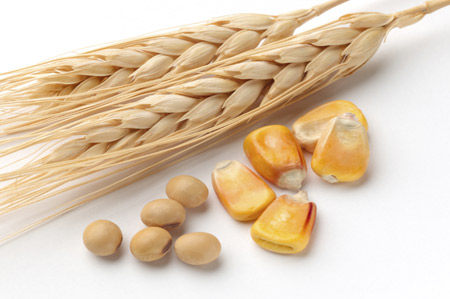 (Reuters) – Chicago soybean futures bounced back on Thursday, rising for five out of six sessions, with prices buoyed by forecasts of more rains in the U.S. Midwest that threaten to further delay the harvest.
(Reuters) – Chicago soybean futures bounced back on Thursday, rising for five out of six sessions, with prices buoyed by forecasts of more rains in the U.S. Midwest that threaten to further delay the harvest.
Wheat rose for a fifth consecutive session as Egypt’s move to reverse its controversial zero-tolerance policy on a common grains fungus supported the market.
Chicago Board Of Trade most-active soybean contract rose 0.5 percent to $9.80-3/4 a bushel by 0247 GMT, having closed down 1.4 percent on Wednesday.
Wheat gained 0.2 percent to $4.08-1/2 a bushel. Corn climbed 0.2 percent to $3.40-3/4 a bushel.
“The U.S. Midwest has been trending a little drier this week, but forecasters say their models are now pointing to wetter conditions for the more soybean heavy production regions today through to Sunday,” said Tobin Gorey, director of agricultural strategy at Commonwealth Bank of Australia.
“The accompanying cooler temperatures have the potential to lengthen drying times.”
Wheat is drawing support after Egypt’s reversal of its zero-tolerance policy on the fungus ergot raised hopes of fresh purchases by the world’s top buyer of the grain.
Egypt has seen its imports grind to a halt since it imposed the ban on ergot last month, with three successive state tenders cancelled because of boycotts by suppliers who say the condition is impossible to guarantee.
Signs of rising demand from India provided additional support to the wheat market.
Indian importers have purchased around 76,000 tonnes of Ukrainian-origin wheat in the past couple of weeks after two years of poor domestic output.
Corn is also being supported by a fungal disease in parts of the U.S. Midwest.
A fungal disease called Diplodia ear rot is lurking in corn fields in some U.S. Midwest regions, and experts and farmers fear lower yields and crop damage that could force growers to accept steep discounts on the cash market.
Diplodia causes a whitish mould between kernels and is common in corn, but its emergence this year appears to be more severe than normal, particularly in central Illinois and western Ohio following a rainy summer, agronomists in those states said.
Commodity funds were net buyers of Chicago Board of Trade wheat futures contracts and net sellers of soybean, soymeal and soyoil contracts. They were net even in corn.




